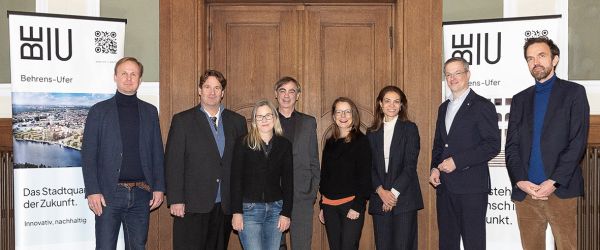food4future at the future projekt "Behrens-Ufer"
Prof. Monika Schreiner as a member of the food LAB during a round table discussion
08.12.2023
Behrens-Ufer is a transformation project from a former industrial area to a technology location where research, development and production are combined with urban life, art and culture. The sustainable concept relies on future-proof energy solutions and a comprehensive circular economy to meet the socio-ecological challenges of the future.
The circular economy in particular is of great interest to us in this project, as the aim is to achieve as much self-sufficiency as possible. This is to be achieved through various circular systems that produce, use and recycle resources and recyclable materials that are generated during production on site. Examples of this include food production in vertical farming systems, rainwater storage and use or thermal recycling. In order to achieve these goals, the BE-U food LAB was founded, a group of experts who, as an integral part of the project, feed the results of their work directly into project development.
The roundtable discussion took place on December 7 with various stakeholders and experts from the BE-U project and the food LAB. The meeting offered an intensive exchange on the interrelated topics of securing skilled workers, climate neutrality and digitalization, which together form a 'magic triangle' and can provide groundbreaking impetus for the social and economic future. The discussion focused on how these aspects affect the design of liveable cities with a high quality of life and which projects in Schöneweide can contribute to this. A central focus was on the further development and upgrading of existing buildings in order to meet the challenges and opportunities of climate adaptation and biodiversity in urban areas. Of particular interest was the question of how information technology can provide decisive support. It was discussed whether buildings, neighbourhoods or entire cities can be modernized and transformed with the help of digitalization, thereby setting new standards for the economy and society.
The importance of biodiversity and urban greening was of particular interest to us. Here, questions were raised about food production in the smart city, particularly in the context of indoor and outdoor farming in the city. The role of information technology in this context was discussed, as was the influence of IT companies and digital knowledge on climate neutrality and sustainability. In addition, it was discussed whether and how the topics of sustainability, climate neutrality and biodiversity influence students' career planning and expectations of digital living and working environments.
Overall, the meeting provided a comprehensive insight into the complex interrelationships between securing skilled workers, climate neutrality and digitalization as well as their impact on the future development of cities and societies.
The participants in the roundtable discussion were (from left to right) Dr. Gregor Keck (Head of Communications at the DIEAG Group, which is managing the BE-U project), Felix Gold (Managing Director, DIEAG Investmentmanagement GmbH), Prof. Dr. Monika Schreiner (Project Coordinator for Agricultural Systems of the Future and food4future at the Leibniz Institute of Vegetable and Ornamental Crops), Christian Raum (Editor-in-Chief of S@PPORT magazine), host Prof. Dr.-Ing. Regina Zeitner (Facility Management course, University of Applied Sciences), Natalie Tacke (Head of Food LAB, BE-U Quartiersmanagement GmbH), Prof. Dr. Tilo Wendler (Vice President, University of Applied Sciences) and Andre Biener (Director, SAP University Alliances).
S@PPORT magazine will be reporting exclusively on the event next year - we look forward to the article!
More information about the BE-U food LAB
The BE-U food LAB is dedicated to the challenge of sustainable food supply in metropolitan areas. The BE-U will be turned into a development center for innovative companies from the food sector, which, in close cooperation with relevant research and development institutions, will set up urban food production at the location and connect it with consumers in the neighborhood - restaurants, cafés and retailers - in a holistic circular economy.
The food LAB will not only research the cultivation of food in urban buildings using technologies such as vertical farming, but also drive forward logistical optimizations to reduce CO2 emissions. We recognize the challenges of a sustainable food supply. We also see the demands placed on the transportation of food in terms of avoiding packaging waste. The BE-U food LAB brings together stakeholders who share our vision of the urban food supply of the future and who are working with us to take the right steps in this direction."
